Snowbound here in Brooklyn. So it’s a perfect time to review some favorites of mine, some of them award winners, some of them in contention, some of them deserving to be in contention, and some of them…not. In alphabetical order.
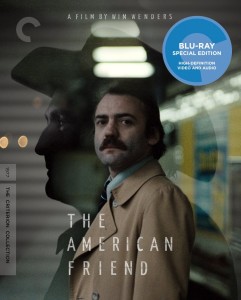 The American Friend: Carol, from a Patricia Highsmith novel, is up for several Academy Awards this year. That lesbian romance is a far cry from her famed thrillers, a number centered on the wandering con man Tom Ripley. Ripley’s Game was made into a good, traditional movie in 2002, starring John Malkovich in a part previously played by Alain Delon and Matt Damon. But Wim Wenders’ offbeat 1977 adaptation, a fusion of German New Wave with American movie iconography (Dennis Hopper plays the duplicitous, art forging Ripley, manipulating a dying Bruno Ganz, and 50s cult directors Samuel Fuller and Nicolas Ray have incisive small roles), is some kind of masterpiece. Using the novel as a base, Wenders finds a distinctive tone as the two characters embark on a desperate journey, less into crime than into the darker recesses of their lonely souls. That sounds awfully pretentious but there’s such buoyancy to the craft (the movie is extraordinarily well shot by Robby Muller), the acting, and the filmmaking chops that you wind up seduced by the surfaces and swept away by the undercurrents. Previously available on DVD, this is already a strong candidate for Blu-ray of the year. Superior extras include a 2002 commentary with Wenders and Hopper, new interviews with Wenders and Ganz, and a clutch of deleted scenes.
The American Friend: Carol, from a Patricia Highsmith novel, is up for several Academy Awards this year. That lesbian romance is a far cry from her famed thrillers, a number centered on the wandering con man Tom Ripley. Ripley’s Game was made into a good, traditional movie in 2002, starring John Malkovich in a part previously played by Alain Delon and Matt Damon. But Wim Wenders’ offbeat 1977 adaptation, a fusion of German New Wave with American movie iconography (Dennis Hopper plays the duplicitous, art forging Ripley, manipulating a dying Bruno Ganz, and 50s cult directors Samuel Fuller and Nicolas Ray have incisive small roles), is some kind of masterpiece. Using the novel as a base, Wenders finds a distinctive tone as the two characters embark on a desperate journey, less into crime than into the darker recesses of their lonely souls. That sounds awfully pretentious but there’s such buoyancy to the craft (the movie is extraordinarily well shot by Robby Muller), the acting, and the filmmaking chops that you wind up seduced by the surfaces and swept away by the undercurrents. Previously available on DVD, this is already a strong candidate for Blu-ray of the year. Superior extras include a 2002 commentary with Wenders and Hopper, new interviews with Wenders and Ganz, and a clutch of deleted scenes.
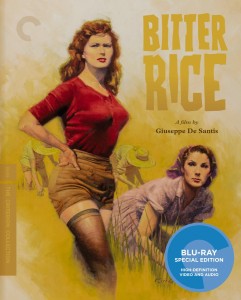 Bitter Rice: You knew Italian neo-realism was a thing when faux neo-realism crept in, selling something other than bicycle thieves. It’s rather evident from the jacket cover that something other than a riveting chronicle of the lives of the poor was being marketed, and that something extra proved a hot tomato at home and abroad in 1949. The movie’s success helped launch an international producing career for Dino De Laurentiis, who married its sultry star, Silvana Mangano. She’s quite something here, strutting through a story, as much noir as neo, set in the rice fields of the Po Valley, where illicit passion and criminal schemes erupt and the plight of the working man is occasionally acknowledged. (It’s not so bad, toiling alongside Mangano and American actress Doris Dowling, of the Oscar-winning The Lost Weekend.) The bad girls make the movie more fun than most of its storied kind, though some may ask how this found its way into the Criterion Collection. For supplements alone, the fully restored film got there honestly, including an hour-long documentary about director Giuseppe De Santis produced by co-writer Carlo Lizzanni (who received an Oscar nomination for Bitter Rice) and a video interview with the prolific Lizzanni, who went on to direct crime movies and spaghetti Westerns.
Bitter Rice: You knew Italian neo-realism was a thing when faux neo-realism crept in, selling something other than bicycle thieves. It’s rather evident from the jacket cover that something other than a riveting chronicle of the lives of the poor was being marketed, and that something extra proved a hot tomato at home and abroad in 1949. The movie’s success helped launch an international producing career for Dino De Laurentiis, who married its sultry star, Silvana Mangano. She’s quite something here, strutting through a story, as much noir as neo, set in the rice fields of the Po Valley, where illicit passion and criminal schemes erupt and the plight of the working man is occasionally acknowledged. (It’s not so bad, toiling alongside Mangano and American actress Doris Dowling, of the Oscar-winning The Lost Weekend.) The bad girls make the movie more fun than most of its storied kind, though some may ask how this found its way into the Criterion Collection. For supplements alone, the fully restored film got there honestly, including an hour-long documentary about director Giuseppe De Santis produced by co-writer Carlo Lizzanni (who received an Oscar nomination for Bitter Rice) and a video interview with the prolific Lizzanni, who went on to direct crime movies and spaghetti Westerns.
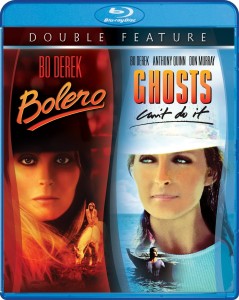 Bolero and Ghosts Can’t Do It: Bo Derek parlayed her sex symbol success in 10 (1979) into the surprise hit Tarzan, the Ape Man (1981), the only Tarzan movie where he was upstaged by Jane. Also directed by her husband John Derek, 1984’s Bolero proved an award-winning smash–at the Razzies, where it won worst picture, actress, director, screenplay, musical score, and new star (Olivia D’Abo), tying a record with Pia Zadora’s very lonely Lonely Lady. But it’s still a little better than their abominable “comedy” followup, 1990’s little-seen Ghosts Can’t Do It, another Razzies chart-topper, where it again claimed worst picture (tied with The Adventures of Ford Fairlane), actress, director, and supporting actor–Donald Trump. “You’re too pretty to be bad.” “You noticed.” How come Ted Cruz hasn’t dragged this skeleton into the campaign? You won’t find any of this info on this barebones, as-is quality Blu, which has little to say about these “vacant-headed” movies, Bolero from the much loved, much derided Cannon Films. (In an interview on an otherwise unrelated Blu-ray, of 1975’s Deadly Hero, co-star Don Murray, a friend of the Dereks, says that the Ghosts company ran for their lives when revolution swept through the Maldives location, but recommends Bolero, saying it’s “funnier.” It is kind of a hoot, watching Bo trying to woo her matador boyfriend’s paralyzed penis to life…”That thing is going to work!” Nothing works in this pairing of glorified home movies.)
Bolero and Ghosts Can’t Do It: Bo Derek parlayed her sex symbol success in 10 (1979) into the surprise hit Tarzan, the Ape Man (1981), the only Tarzan movie where he was upstaged by Jane. Also directed by her husband John Derek, 1984’s Bolero proved an award-winning smash–at the Razzies, where it won worst picture, actress, director, screenplay, musical score, and new star (Olivia D’Abo), tying a record with Pia Zadora’s very lonely Lonely Lady. But it’s still a little better than their abominable “comedy” followup, 1990’s little-seen Ghosts Can’t Do It, another Razzies chart-topper, where it again claimed worst picture (tied with The Adventures of Ford Fairlane), actress, director, and supporting actor–Donald Trump. “You’re too pretty to be bad.” “You noticed.” How come Ted Cruz hasn’t dragged this skeleton into the campaign? You won’t find any of this info on this barebones, as-is quality Blu, which has little to say about these “vacant-headed” movies, Bolero from the much loved, much derided Cannon Films. (In an interview on an otherwise unrelated Blu-ray, of 1975’s Deadly Hero, co-star Don Murray, a friend of the Dereks, says that the Ghosts company ran for their lives when revolution swept through the Maldives location, but recommends Bolero, saying it’s “funnier.” It is kind of a hoot, watching Bo trying to woo her matador boyfriend’s paralyzed penis to life…”That thing is going to work!” Nothing works in this pairing of glorified home movies.)
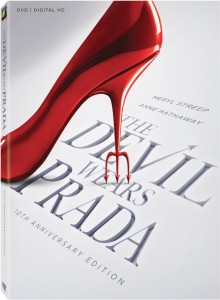 The Devil Wears Prada: Other than a digital copy and a slipcover, there’s nothing new about this 10th anniversary edition. Some anniversary. But the price is right if you don’t have the extras-studded disc, and I love the movie, which I underrated back then. Its dissection of office politics has held up well, with Anne Hathaway climbing the rungs and Meryl Streep ascending into a surprise mega-stardom, and one of the reasons I enjoy Supergirl is that Melissa Benoist and Calista Flockhart (both terrific) play a similar dynamic amidst the superheroics.
The Devil Wears Prada: Other than a digital copy and a slipcover, there’s nothing new about this 10th anniversary edition. Some anniversary. But the price is right if you don’t have the extras-studded disc, and I love the movie, which I underrated back then. Its dissection of office politics has held up well, with Anne Hathaway climbing the rungs and Meryl Streep ascending into a surprise mega-stardom, and one of the reasons I enjoy Supergirl is that Melissa Benoist and Calista Flockhart (both terrific) play a similar dynamic amidst the superheroics.
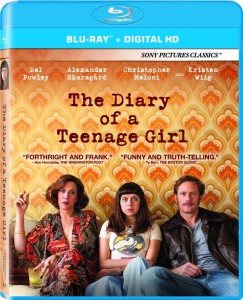 The Diary of a Teenage Girl: One of the best movies of last year. The adult movie about precocious teenage sexuality that only a woman could have made with such artistry, candor, and wit. (It was no surprise to see the gifted Marielle Heller among the directors of Amazon’s excellent Transparent, the only show I’ve ever binge-watched–her movie has the same observant, non-judgmental vibe.) Not worth discussing in the same breath as more commercial, and more evasive, films like Trainwreck and Fifty Shades of Gray, this is the real deal, on the streets, in the 70s, yet recognizably today. The fashions and mores have changed but the issues it raises, about the liberating if queasy intersection of adolescence and adulthood, which we all face in some form in our lives, are eternal. Highly recommended, if you can stand the shocks, and the shocks of recognition. Good extras, too, including a fun commentary and interview segments with Heller and co-stars Bel Powley and Alexander Skarsgard (such brave, unforced performances), Heller’s personal journey with Phoebe Gloeckner’s graphic novel, and some deleted scenes.
The Diary of a Teenage Girl: One of the best movies of last year. The adult movie about precocious teenage sexuality that only a woman could have made with such artistry, candor, and wit. (It was no surprise to see the gifted Marielle Heller among the directors of Amazon’s excellent Transparent, the only show I’ve ever binge-watched–her movie has the same observant, non-judgmental vibe.) Not worth discussing in the same breath as more commercial, and more evasive, films like Trainwreck and Fifty Shades of Gray, this is the real deal, on the streets, in the 70s, yet recognizably today. The fashions and mores have changed but the issues it raises, about the liberating if queasy intersection of adolescence and adulthood, which we all face in some form in our lives, are eternal. Highly recommended, if you can stand the shocks, and the shocks of recognition. Good extras, too, including a fun commentary and interview segments with Heller and co-stars Bel Powley and Alexander Skarsgard (such brave, unforced performances), Heller’s personal journey with Phoebe Gloeckner’s graphic novel, and some deleted scenes.
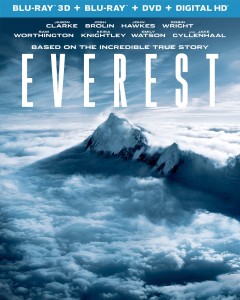 Everest: The perfect movie for our weather, and, along with The Walk and Mad Max: Fury Road, one of too few recent movies to take advantage of the immersive possibilities of 3D. I liked and respected the movie, a flop here but a hit overseas, where audiences are perhaps less hope-dependent. The 3D Blu-ray is astonishing, subjecting your viewing room to gale-force winds and snow that, with the dimensionality of image and Dolby Atmos audio, bring you right into the vortex of the unfolding tragedy. As does director Baltasar KormÁ¡kur’s extremely thorough commentary, which is supported by some making-ofs about the locations, the effects work, the cast preparations for the mountain shoots, and the real-life tragedy that inspired the film.
Everest: The perfect movie for our weather, and, along with The Walk and Mad Max: Fury Road, one of too few recent movies to take advantage of the immersive possibilities of 3D. I liked and respected the movie, a flop here but a hit overseas, where audiences are perhaps less hope-dependent. The 3D Blu-ray is astonishing, subjecting your viewing room to gale-force winds and snow that, with the dimensionality of image and Dolby Atmos audio, bring you right into the vortex of the unfolding tragedy. As does director Baltasar KormÁ¡kur’s extremely thorough commentary, which is supported by some making-ofs about the locations, the effects work, the cast preparations for the mountain shoots, and the real-life tragedy that inspired the film.
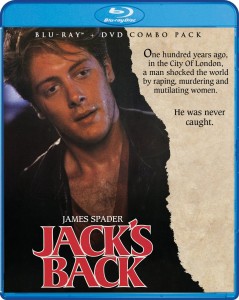 Jack’s Back: Long before his Emmy-winning TV stardom on Boston Legal and The Blacklist, James Spader played preppy types, sinning (Pretty in Pink, Less Than Zero) and sinned against (Bad Influence). In this twisty thriller, a change of pace that expanded his range right before his early breakthrough in Sex, Lies, and Videotape (1989), Spader’s doctor finds himself accused of Jack the Ripper-style crimes; without revealing one of the plot’s complications, his ne’er do well twin brother gets involved in the investigation. An 80s favorite of mine, Cynthia Gibb, and cult actor Robert Picardo co-star. Siskel and Ebert raved about this one in 1988 and based on their enthusiasm I went to see it; I wasn’t as impressed, but it was decent, and the actor’s increased visibility might win it a few new look-sees on Blu-ray and DVD. The attractive HD transfer is augmented by interviews with Gibb and writer-director Rowdy Herrington, who also provides a commentary track. He’s best known for his subsequent movie, Road House (1989), which I don’t think Siskel and Ebert were as keen on.
Jack’s Back: Long before his Emmy-winning TV stardom on Boston Legal and The Blacklist, James Spader played preppy types, sinning (Pretty in Pink, Less Than Zero) and sinned against (Bad Influence). In this twisty thriller, a change of pace that expanded his range right before his early breakthrough in Sex, Lies, and Videotape (1989), Spader’s doctor finds himself accused of Jack the Ripper-style crimes; without revealing one of the plot’s complications, his ne’er do well twin brother gets involved in the investigation. An 80s favorite of mine, Cynthia Gibb, and cult actor Robert Picardo co-star. Siskel and Ebert raved about this one in 1988 and based on their enthusiasm I went to see it; I wasn’t as impressed, but it was decent, and the actor’s increased visibility might win it a few new look-sees on Blu-ray and DVD. The attractive HD transfer is augmented by interviews with Gibb and writer-director Rowdy Herrington, who also provides a commentary track. He’s best known for his subsequent movie, Road House (1989), which I don’t think Siskel and Ebert were as keen on.
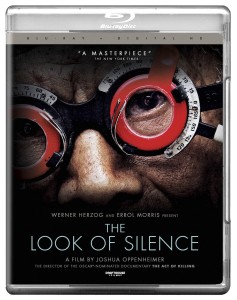 The Look of Silence: 20 Feet from Stardom (2012) is a hugely enjoyable documentary–but The Act of Killing is a hugely important, and necessary, one, and its loss at the 2013 Oscars still rankles. Joshua Oppenheimer’s equally valuable followup deserves to win, but has another successful showbiz doc, Amy, in its way. I can only hope that voters will do right by it. Be that as it may, what we have here is a different perspective on long-hidden atrocities committed by the witch-hunting Indonesian government in the 1960s, with the optometrist brother of one of the victims fitting some of the perpetrators with glasses, and letting them speak about their crimes. As in the first film, the killers are shockingly brazen about discussing their 50-year-old misdeeds, some of which whom were filmed back then; a sliver of hope, if not redemption, is offered by their aghast children, who, knowing little of the purges, have to reckon with the past. (As for the present, it’s clear that some of these men still have government ties, and the optometrist and his family have had to relocate since the film’s release.) A devastating document that proves the adage that the past is never past, the Blu-ray comes with some outstanding extras: A commentary (not well recorded, but worth a listen) with the director and executive producer Errol Morris, a post-Berlinale festival screening conversation with Oppenheimer and executive producer Werner Herzog, an interview with Oppenheimer, and footage from the Indonesian premiere, which, with the gamut of emotions unleashed, is revealing in itself.
The Look of Silence: 20 Feet from Stardom (2012) is a hugely enjoyable documentary–but The Act of Killing is a hugely important, and necessary, one, and its loss at the 2013 Oscars still rankles. Joshua Oppenheimer’s equally valuable followup deserves to win, but has another successful showbiz doc, Amy, in its way. I can only hope that voters will do right by it. Be that as it may, what we have here is a different perspective on long-hidden atrocities committed by the witch-hunting Indonesian government in the 1960s, with the optometrist brother of one of the victims fitting some of the perpetrators with glasses, and letting them speak about their crimes. As in the first film, the killers are shockingly brazen about discussing their 50-year-old misdeeds, some of which whom were filmed back then; a sliver of hope, if not redemption, is offered by their aghast children, who, knowing little of the purges, have to reckon with the past. (As for the present, it’s clear that some of these men still have government ties, and the optometrist and his family have had to relocate since the film’s release.) A devastating document that proves the adage that the past is never past, the Blu-ray comes with some outstanding extras: A commentary (not well recorded, but worth a listen) with the director and executive producer Errol Morris, a post-Berlinale festival screening conversation with Oppenheimer and executive producer Werner Herzog, an interview with Oppenheimer, and footage from the Indonesian premiere, which, with the gamut of emotions unleashed, is revealing in itself.
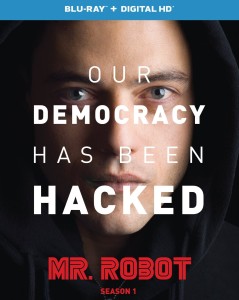 Mr. Robot: If you watched The Martian after it won its Golden Globe, you may be wondering what happened to its music and comedy. Stupid–but this year at least it was way hipper regarding TV, whereas David Hyde Pierce and Kathy Baker continue to win Emmys for shows that went off 20 years ago. I still don’t know what to make of this out-there USA Network show, which won Golden Globes for dramatic series and comeback kid co-star Christian Slater, yet after you’ve watched just an episode or two you know you’re seeing something brainy and forward-thinking, and I wasn’t sure where it was headed from episode to episode. Think the dystopian psychodrama of Fight Club merged with Matrix-like philosophizing and hang on. Slater is the title character, a revolutionary “hacktivist” who brings a clinically depressed security engineer (Rami Malek) into his orbit, to disrupt the operations of the conglomerate he services. Sam Esmail, the show’s creator, very deftly keeps a lot of balls up in the air, buoyed by the excellent casting–I see guys like Malek on the subway, when they’re off their screens and struggling to interact. Now I’m wondering what’s up with them…Blu-ray, with superior sound and audio, no commercials and buffering, is the best way to experience all this must-watch TV that’s coming at us from all over the spectrum, and Mr. Robot is exceptionally well done. Extras aren’t much for the ten-episode show–some deleted scenes and a gag reel, plus a making-of that dwells on what the show is but not what it means, which is all for the best. You decide.
Mr. Robot: If you watched The Martian after it won its Golden Globe, you may be wondering what happened to its music and comedy. Stupid–but this year at least it was way hipper regarding TV, whereas David Hyde Pierce and Kathy Baker continue to win Emmys for shows that went off 20 years ago. I still don’t know what to make of this out-there USA Network show, which won Golden Globes for dramatic series and comeback kid co-star Christian Slater, yet after you’ve watched just an episode or two you know you’re seeing something brainy and forward-thinking, and I wasn’t sure where it was headed from episode to episode. Think the dystopian psychodrama of Fight Club merged with Matrix-like philosophizing and hang on. Slater is the title character, a revolutionary “hacktivist” who brings a clinically depressed security engineer (Rami Malek) into his orbit, to disrupt the operations of the conglomerate he services. Sam Esmail, the show’s creator, very deftly keeps a lot of balls up in the air, buoyed by the excellent casting–I see guys like Malek on the subway, when they’re off their screens and struggling to interact. Now I’m wondering what’s up with them…Blu-ray, with superior sound and audio, no commercials and buffering, is the best way to experience all this must-watch TV that’s coming at us from all over the spectrum, and Mr. Robot is exceptionally well done. Extras aren’t much for the ten-episode show–some deleted scenes and a gag reel, plus a making-of that dwells on what the show is but not what it means, which is all for the best. You decide.
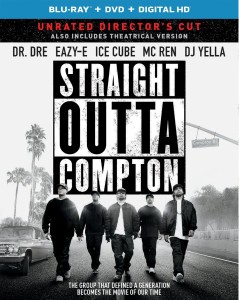 Straight Outta Compton: Good news: the most successful musical biopic of all time received an Oscar nomination for best original screenplay. Bad news: the four screenwriters are all white. Diversity and the Academy Awards, it’s a pickle. Rather than try to solve it, let me just say that the nomination was earned–this is a boisterous chronicle of the rise and fall of the controversial N.W.A., no different than most of its kind by smoothing over some of the rougher edges of a very rough story, and more candid and blunt than many. The uncut version, clocking in at 167 minutes, gives the history more of a chance to breathe–that said, I wonder if a third, condensed version, sticking to the essentials, might some day be prepared. However, knowing more about the group’s notoriety than its music or its personalities, I came away informed, and from all the skirmishes on and off the stage marvel at how Ice Cube transformed into the slow-burn comic actor he is today. (His son, O’Shea Jackson, Jr., plays him very capably–they’re all very good, including Jason Mitchell as the doomed Eazy-E, though Paul Giamatti, cornering the market for shady record industry types, repurposes his Love & Mercy portrayal.) The making-of material is on the concise side, fleshed out by an expansive commentary by F. Gary Gray, who got his start directing Ice Cube videos and knows the subject as intimately as anyone.
Straight Outta Compton: Good news: the most successful musical biopic of all time received an Oscar nomination for best original screenplay. Bad news: the four screenwriters are all white. Diversity and the Academy Awards, it’s a pickle. Rather than try to solve it, let me just say that the nomination was earned–this is a boisterous chronicle of the rise and fall of the controversial N.W.A., no different than most of its kind by smoothing over some of the rougher edges of a very rough story, and more candid and blunt than many. The uncut version, clocking in at 167 minutes, gives the history more of a chance to breathe–that said, I wonder if a third, condensed version, sticking to the essentials, might some day be prepared. However, knowing more about the group’s notoriety than its music or its personalities, I came away informed, and from all the skirmishes on and off the stage marvel at how Ice Cube transformed into the slow-burn comic actor he is today. (His son, O’Shea Jackson, Jr., plays him very capably–they’re all very good, including Jason Mitchell as the doomed Eazy-E, though Paul Giamatti, cornering the market for shady record industry types, repurposes his Love & Mercy portrayal.) The making-of material is on the concise side, fleshed out by an expansive commentary by F. Gary Gray, who got his start directing Ice Cube videos and knows the subject as intimately as anyone.





Comments